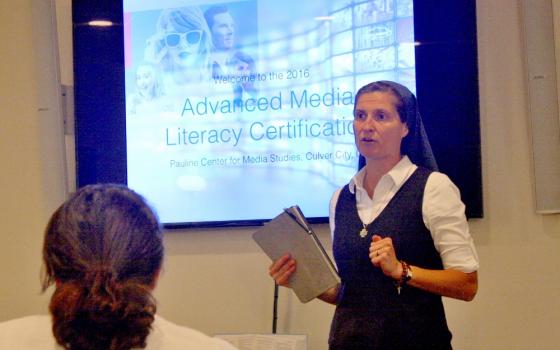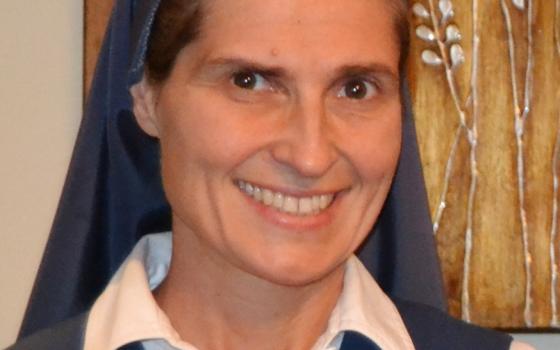Next month, about 200 people will convene at Twitter headquarters in San Francisco for the Digital Citizenship Summit. There, they and countless others joining via livestream will hear from media and tech experts on how emerging media can be used in ways that are "safe, savvy and ethical."
One of the experts that attendees will hear from is Daughter of St. Paul Sr. Nancy Usselmann, the director of the Pauline Center for Media Studies. Usselmann, a media ethicist, assumed the directorship in January; however, she's been teaching media ethics and literacy across the country for the last 20 years.
Usselmann spoke with Global Sisters Report about what it means to be Catholic in in the Internet Age.
GSR: What is it that you'll be presenting on at the Digital Citizenship Summit?
Usselmann: They haven't finalized it yet [laughing], but I can tell you exactly what I proposed to them to speak about: ethics in an emerging mediascape and transsocial digital communications [relating socially across digital platforms, often in multiple ways at the same time] and the human person. My focus is on how the whole social life is grounded in the foundation of the human person.
Every societal expression needs to be — or should be — directed toward human dignity for it to flourish. So does the emergence of these transsocial digital networks affect what it means to be human? How does it really affect our understanding of community within the wider societal culture? Is it the same as face-to-face interaction and personal connection? Possibly not. But does it mean it's not a community? Not necessarily. It has pros and cons, and I think the ethics of it is to really evaluate how the human person is looked upon. How is the human person addressed?
What I really do is look at it from a media mindfulness pedagogy: helping people to discuss how we can be a transformative ethical presence within the emerging mediascape, especially those of us who work as educators or ministers of the Gospel.
And why is that important?
I think it's pretty obvious. We can go online, and so much is bombarding us at any moment — for good and for evil. Pornography is becoming more and more and more rampant digitally, and it's popping up in every place. Any new social media is going to be an opportunity for those who work in the pornography industry to try and find a way in. Kik and Snapchat are very popular among young teens, but it also can be an opportunity, and it has been used as an inroad for human trafficking and for pornography.
I mean, it's a huge issue for parents right now, to know where and how they can allow their kids to be present in that social media world. But how do you regulate these things? Who's going to be the one to set those parameters? Are there going to be regulations made by the government? Well, that's not necessarily going to be the answer because, as we know from the past, it doesn't help.
So it's probably more about teaching people to be more ethically aware and media mindful — to be asking questions of the media. We can always challenge it to be better, to be an opportunity for the good that it is. We have to be ethically aware at every moment, really.
In your ministry, do you ever look at the other side of that? It's one thing for people to learn how to navigate all that is accessible to them on the internet as users, but what about the way people use the internet to harm others? For example, just today I was reading about a New Jersey politician who used Facebook to tell a reporter he hoped she was raped. Do you look at things like that?
I definitely look at how we interact with each other now that we have this technology. Cyberbullying is a very big thing. Perhaps people said these things before, but now it's public. In a second, it becomes global, and we didn't have that before.
There's an ethics present in how we treat other people, regardless [of the medium]. But now you can ruin a person's reputation by one tweet. And that has huge ethical ramifications. So, yes, it is teaching that — how do we interact now within this digital mediascape — and yet, also, how do we react to what's already out there? It's both/and.
Yet, despite these challenges, you believe media and the internet are good?
[At the Pauline Center for Media Studies] our perspective is to look at all of media as gifts of God and to take them as a gift from God, but to be critical thinkers, critical users and creators of media so that it can really be a communication of grace for others. That's a very Catholic perspective and a gift we have to be able to contribute to the culture and to the whole digital media culture.
We have a very unique perspective as Catholics, especially because of our incarnational and sacramental theology. It helps us to see that the tangible, the material, the world, is a place where God's grace is present. And those are our places, our opportunities for evangelization.
What are some internet best practices you can share with our readers?
We've created a process of theological reflection, and it's called media mindfulness. It's paying attention (really being aware); assertiveness (How do I really evaluate what's happening?); dialogue; and, last, asking, 'What is this going to do for me?' So it's creating those four parts of the theological reflection — a media mindfulness — that really helps each of us to be more conscious users and creators of media.
[Dawn Araujo-Hawkins is Global Sisters Report staff writer based in Kansas City, Missouri. Her email address is daraujo@ncronline.org. Follow her on Twitter: @dawn_cherie.]


